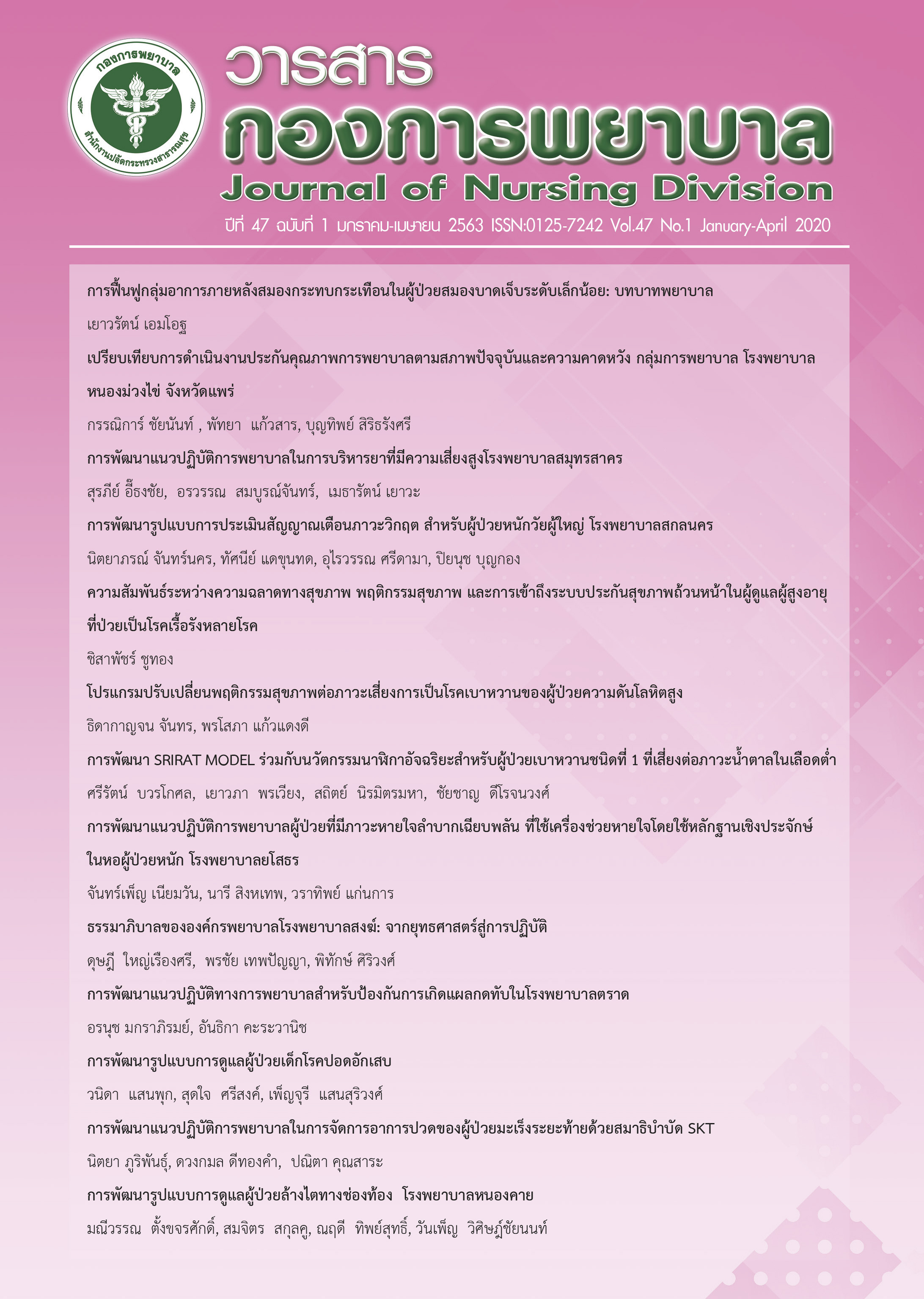การพัฒนา SRIRAT MODEL ร่วมกับนวัตกรรมนาฬิกาอัจฉริยะสำหรับผู้ป่วยเบาหวานชนิดที่ 1 ที่เสี่ยงต่อภาวะน้ำตาลในเลือดต่ำ
Main Article Content
บทคัดย่อ
การวิจัยและพัฒนา (Research and development) มีวัตถุประสงค์เพื่อพัฒนา SRIRAT MODEL และศึกษาผลของการใช้ SRIRAT MODEL ร่วมกับนวัตกรรมนาฬิกาอัจฉริยะสำหรับผู้ป่วยเบาหวานชนิดที่ 1 ที่เสี่ยงต่อภาวะน้ำตาลในเลือดต่ำ ขั้นตอนการดำเนินการวิจัยมี 4 ระยะ 1) วิเคราะห์สถานการณ์ปัญหา 2) พัฒนา SRIRAT MODEL 3) ทดลองใช้ และ 4) ประเมินผลลัพธ์ กลุ่มตัวอย่างคัดเลือกแบบเฉพาะเจาะจงตามคุณสมบัติที่กำหนด ซึ่งแบ่งเป็น 2 กลุ่ม คือ 1) กลุ่มผู้ป่วยเบาหวานชนิดที่ 1 จำนวน 70 คน โดยแบ่งออกเป็นกลุ่มทดลองและกลุ่มควบคุม จำนวนกลุ่มละ 35 คน 2) กลุ่มทีมสหสาขาวิชาชีพ จำนวน 38 คน เครื่องมือที่ใช้ในการดำเนินการวิจัย ได้แก่ SRIRAT MODEL เครื่องมือเก็บรวบรวมข้อมูล ได้แก่ แบบสอบถามข้อมูลส่วนบุคคล และแบบประเมินผลลัพธ์ ประกอบด้วย 1) แบบสอบถามอัตราความสำเร็จของการเข้าถึงบริการ 2) แบบสอบถามระยะเวลาการให้บริการ 3) แบบสอบถามด้านคุณภาพการดูแลผู้ป่วยเบาหวาน 4) แบบสอบถามความรอบรู้ด้านสุขภาพ และ 5) แบบสอบถามความพึงพอใจของผู้เกี่ยวข้อง วิเคราะห์ข้อมูลโดยใช้สถิติเชิงพรรณนา ได้แก่ การแจกแจงความถี่ ร้อยละ ค่าเฉลี่ย ส่วนเบี่ยงเบนมาตรฐาน และการทดสอบค่าที
ผลการวิจัยพบว่า SRIRAT MODEL มี 6 องค์ประกอบ คือ S : Self-care and Family support R : Rapid Response I : Innovation R : Resource sharing A : Accessibility และ T : Teamwork ด้านผลลัพธ์การใช้ SRIRAT MODEL พบว่าหลังจากกลุ่มทดลองได้รับ SRIRAT MODEL คะแนนเฉลี่ยด้านผลลัพธ์ดีกว่ากลุ่มควบคุมอย่างมีนัยสำคัญทางสถิติ (p<.05) โดยมีค่าเฉลี่ยอัตราความสำเร็จการเข้าถึงบริการ คุณภาพการดูแลผู้ป่วยเบาหวาน ความรอบรู้ด้านสุขภาพ และความพึงพอใจของผู้ให้บริการและผู้รับบริการเพิ่มขึ้นอย่างมีนัยสำคัญทางสถิติ (p<.05) สำหรับค่าเฉลี่ยระยะเวลาที่ใช้ในการให้บริการลดลงอย่างมีนัยสำคัญทางสถิติ (p<.05) อย่างไรก็ตามการพัฒนา SRIRAT MODEL ร่วมกับนวัตกรรมนาฬิกาอัจฉริยะสำหรับผู้ป่วยเบาหวานชนิดที่ 1 ที่เสี่ยงต่อภาวะน้ำตาลในเลือดต่ำยังต้องมีการติดตามและประเมินผลอย่างต่อเนื่องต่อไป
Article Details
เอกสารอ้างอิง
Guideline for Diabetes 2017. 3rd ed. Bangkok:1-220. Thai.
2. Department of Medical Services. Annual Report 2017 Department of Medical Services, Ministry of Public Health. Bangkok:2017;1-122. Thai.
3. Diabetes Center Rajavithi Hospital. Statistical Report. 2018. Bangkok:1-262. Thai.
4. Likitmaskul S, Wekawanich J, Wongarn R, et al. Intensive diabetes education program and multidisciplinary team approach in management of newly
diagnosed type 1 diabetes mellitus: a greter patient benefit, experience at Siriraj Hospital. J Med Assoc Thai. 2002;85(Suppl 2): S488-95.
5. Niramitmahapanya S, Chawla R, Yotha D. The study of parameters of smart watch in predicting risk of hypoglycemia in Diabetes Mellitus patient comparing to
continuous glucose monitoring system between 1 March to 30 September, 2016. Thai.
6. Rajavithi Hospital. Master Plan Strategy Rajavithi Hospital 2017-2021. Bangkok:2018. 1-16. Thai.
7. Somchit H. Nursing Research: Self-Care Among Persons with Diabetes in Thailand. Journal of Research Methodology. 2002;15(2):191-222. Thai.
8. Ratanaporn J, Apinya S. Development of Self-care Agency in Diabetic Patient with Fear of Hypoglycemia from Insulin Administration: A case study. Rama Nurs
J. 2016;22 (3):233-246. Thai.
9. Diabetes Association of Thailand, National Health Security Office, Faculty of Medicine Siriraj Hospital, Thai Society for Pediatric Endocrinology, Endocrine
Disease Association of Thailand, Department of Medical Services, et al. Type 1 Diabetes and Diabetes diagnosed at Age less than 30 years old Registry.
2018.Thai.
10. Health Education Division. Department of Health Service Support. Health Literacy and 3A 2S
Health Behaviors of People 15 years later, Revision 2018. Nonthaburi:2017. Thai.
11. Wagg AJ, Callanan MM, Hassett A. The use of computer mediated communication in providing patients support : a review of the research literature.
International Journal of Nursing Studies. 2019;82:68–78.
12. Usanee B, Yaowalak A, Chukiat P. Quality of Care for Diabetes Patient in Tambon Health Promotion Hospital of Phrachomklao Hospital Services Network.
Veridian E-Journal, Silpakorn University. 2017;10(2):1990-2008. Thai.
13. Pornvijit P, Suteeporn M, Chettha K. The Effectiveness of a Program for Health Literacy Development of the Patients with Uncontrolled Type 2 Diabetes at
Bangwua District, Chachoengsao Province. Nursing Journal of the Ministry of Public Health, 2017;27(3):91-106. Thai.
14. Patjamontri S, Khemaprasit K, Santiprabhob J, et al. The effect of Early Diabetes Self-Management Education on Glycemic Control in children with Type 1
Diabetes . Southeast Asian J Trop Med Public Health. 2018;49(2):304-13.
15. Mulvaney SA, Lybarger C, Wallston KA, et al. An Internet-based Program to Improve Self-Management in Adolescents With Type 1 Diabetes. Diabetes Care.
2010;33(3):602-4.


